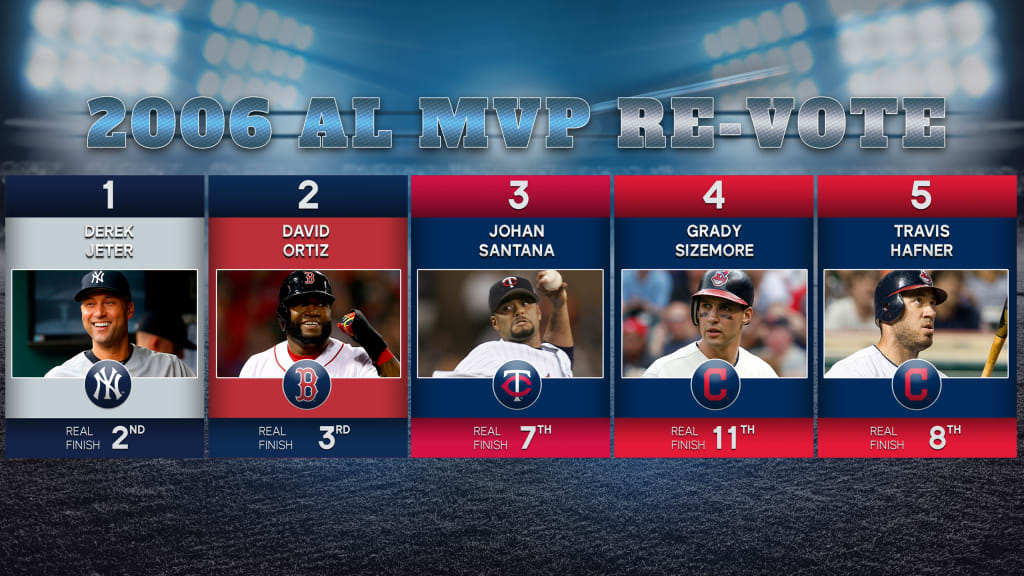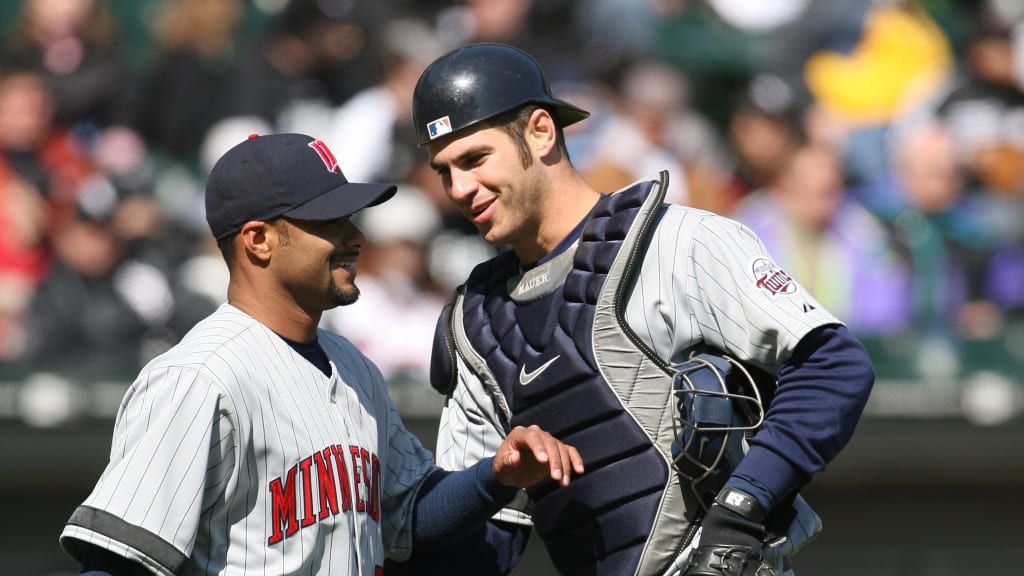
Derek Jeter's brilliant career landed him in Cooperstown, after he was voted in by the Baseball Writers' Association of America almost unanimously back in January.
His résumé included five World Series titles, World Series and All-Star Game MVP Awards, an American League Rookie of the Year Award, two Hank Aaron Awards and a Roberto Clemente Award.
The one notable absence on the 14-time All-Star's lengthy list of accomplishments? An AL MVP Award.
Jeter finished in the top three of MVP voting three times in his career, including a pair of third-place finishes in 1998 and 2009. In '06, however, Jeter placed second behind Justin Morneau, finishing just 14 points behind the Twins first baseman.
Did Morneau deserve the award?
Morneau hit .321 with 34 home runs and 130 RBIs, pacing a Twins offense that finished eighth in the AL in runs scored. The numbers were impressive, though based solely on those three traditional stats, one could argue that David Ortiz (.287/54/137), Jermaine Dye (.315/44/120), Travis Hafner (.308/42/117) or Vladimir Guerrero (.329/33/116) should have been right there with Morneau.
Seven players posted a higher OPS than Morneau's .934, including five over 1.000 (Hafner, Manny Ramirez, Ortiz, Jim Thome and Dye) along with Joe Mauer, whose .936 bettered his teammate by a narrow margin.
Jeter, who was second in the league with a .343 average and collected 214 hits, 118 runs scored, 97 RBIs and 34 stolen bases, won the AL’s Hank Aaron Award that season. Jeter also collected his third consecutive Gold Glove Award at shortstop, a premium defensive position compared to first base.
In an effort to see whether justice was served, MLB.com gathered 15 of its writers to re-vote on the award with the benefit of hindsight. Knowing what we know today about the way players are valued, would the results differ?
The scoring used was the same as the BBWAA’s: A first-place vote is worth 14 points. From second through 10th, the ballot spots are worth 9-8-7-6-5-4-3-2-1 points, respectively. And to keep the re-vote based somewhat in the reality of 2006, voters were only allowed to consider the 33 players who received MVP votes that year.
The real Top 5
- Justin Morneau, 1B, MIN
- Derek Jeter, SS, NYY
- David Ortiz, DH, BOS
- Frank Thomas, DH, OAK
- Jermaine Dye, RF, CWS
The “new” Top 5
- Derek Jeter, SS, NYY
- David Ortiz, DH, BOS
- Johan Santana, SP, MIN
- Grady Sizemore, CF, CLE
- Travis Hafner, DH, CLE
THAT WAS THEN …
Morneau’s big numbers for the 96-win Twins helped him capture his first and only MVP Award, though even at the time, some argued that teammates Mauer and Johan Santana (who finished sixth and seventh, respectively) may have been more valuable to Minnesota that season.

One factor that may have helped Morneau was the fact that he bounced back from a sluggish start to post a huge season. On June 7, Morneau was benched by Twins manager Ron Gardenhire, who believed the slugger was lacking focus on the field. Morneau came back from his one-day hiatus and slashed .362/.412/.611 with 23 homers and 92 RBIs in 104 games after that point, helping the Twins -- who were 25-33 to that point -- go 71-33 the rest of the way, overcoming a double-digit deficit to capture the AL Central title.
Jeter slashed .343/.417/.483 with 14 homers for the 97-win Yankees, who edged the Twins for the AL's best record. Jeter received 12 first-place votes to Morneau’s 15, while Santana received one.
Much was made at the time of one voter’s decision to place Jeter sixth on his ballot, a stark difference from the other 27 voters. In addition to his 12 first-place votes, Jeter was listed second on 14 ballots and fourth on another, while Morneau had eight second-place votes, three thirds and two fourths, enough to beat Jeter by 14 points in the final tally.
Wins Above Replacement was not a commonly used metric in MVP votes back in 2006, evidenced by the results. Among the 33 players that received votes, Morneau ranked 19th with 4.3 WAR, per Baseball-Reference, while Jeter was ninth (5.6). Santana actually had the highest WAR of any AL player that year at 7.6, a full 1.0 WAR ahead of Sizemore (6.6).
BIGGEST GAINERS IN THE RE-VOTE
Jeter surged into the top spot in our re-vote, earning six first-place votes, five seconds, one third, one fourth, one sixth and one seventh. Interestingly, while that was enough to finish first, his percentage of first-place votes (40%) was lower than the actual vote, in which he was put in the top spot on 43% of ballots. He received one sixth-place vote just as he did in 2006, though one voter put him seventh, lower than anybody did 14 years ago.
Ortiz rose from third to second, receiving three first-place votes, two seconds, two thirds and four fourths while being named on all 15 ballots.
Santana received a big bump in the re-vote, climbing from seventh to third. The unanimous Cy Young Award winner in 2006, Santana led the Majors in wins (19), ERA (2.77), strikeouts (245) and WHIP (0.997), and he led the AL in innings (233 2/3). The left-hander -- who led the AL with 7.6 bWAR and ranked second with 6.7 fWAR -- received three first-place votes, one second and four thirds, named on 13 of 15 ballots.
Grady Sizemore had the most notable jump in the re-vote, moving from 11th to 4th. Sizemore led the AL with 134 runs scored and 53 doubles, hitting 28 homers with 76 RBIs and 22 stolen bases and a .907 OPS out of the leadoff spot for the Indians. And according to FanGraphs WAR, Sizemore was the best player in the AL that year (7.9 fWAR). Sizemore, who was named on 12 of 15 ballots (80%) in the re-vote, appeared on only 12 of 28 ballots (43%) in the actual vote, garnering only one vote as high as fifth and seven votes in the No. 10 spot.
Other big gainers included Hafner (eighth to fifth), Wells (tied-22nd to 12th) and Manny Ramirez (18th to 13th).
BIGGEST FALLERS IN THE RE-VOTE
Our voters not only decided that Morneau didn’t deserve to in the MVP in 2006, but based on the re-vote, his season wasn’t good enough to place in the top five.
Morneau placed seventh in the re-vote, earning zero first-place votes in the process. The slugger received one second, one third, one fourth, two sixths, one seventh and three eighths, appearing on only nine of the 15 ballots. Not only did Morneau finish outside of the top five, but he placed third among Twins in the re-vote, trailing both Santana (3rd) and Mauer (6th).
Dye’s huge season helped the White Sox to 90 wins (albeit in a third-place finish in a strong AL Central), but it wasn’t as impressive to our panel as it was 14 years ago; he came in eighth -- a three-spot fall from his actual fifth-place finish. Dye was named on all 28 ballots in 2006, receiving one second-place vote, two thirds, sixth fourths and five fifths, but the re-vote saw him earn one third, two fourths and one fifth among the 12 votes he received.
Thomas, who finished fourth in the 2006 vote, plummeted to 11th in the re-vote. The Big Hurt was named on 26 of 28 ballots back then, but only five of our 15 voters found a spot for him on their ballot.
WHAT HAVE WE LEARNED?
There was plenty of outrage back in 2006 when the results were announced, especially in New York, where many believed Jeter had been robbed of his best chance at an MVP Award.
That turned out to be the case. Jeter’s third-place finish in 2009 -- a Minnesota player bested him again, as Mauer won the honor -- was his only top-five finish after '06, leaving him without an MVP Award when he retired in '14.
Jeter’s career might not have been viewed any differently had he won; he cruised into the Hall of Fame earlier this year with 99.7% of the vote.
Morneau went on to finish as the runner-up to Dustin Pedroia in 2008, the only other time in his career he was a factor in an MVP vote. His '06 season was impressive by any measure, but the fact that two of his teammates (Santana and Mauer) were considered by many to be more valuable to the Twins has tainted the memory of Morneau’s MVP win.
